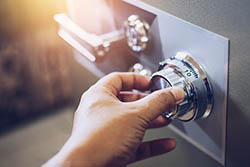
o many of the documents we all use in our personal lives these days are digital. However, there are still many that you should retain as hard copies. These include birth, marriage and death certificates; Social Security cards; tax returns; passports; and estate planning documents, such as deeds and wills.
Be sure to safeguard these records from physical harm — literally. If you’re going to keep them at home, invest in a safe that’s both fireproof and waterproof. Better yet, consider storing them or copies of them in a safe deposit box at a reputable bank.
You can keep digital documents in a safe or safe deposit box as well. Save them on a password-protected device such as a flash drive or external hard drive and add them to your protected paper files. Of course, you can store digitized documents in the cloud, but it’s a good idea to have “redundant backups” in case the cloud service fails or gets hacked.
If you do invest in a fireproof, waterproof safe, consider stashing some cash in it as well. In the event of a major disaster, ATMs may not work, and banks could close for an extended period. Exactly how much you should set aside depends on your risk level and your need for basics such as food, lodging, medical supplies, gasoline and groceries.
